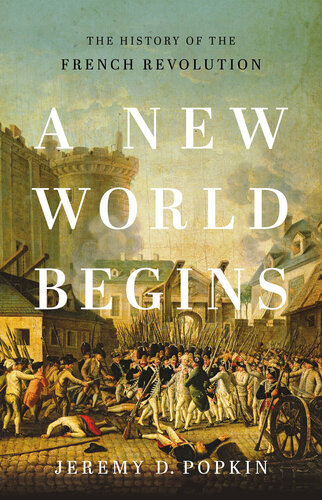
A New World Begins
The History of the French Revolution
کتاب های مرتبط
- اطلاعات
- نقد و بررسی
- دیدگاه کاربران
نقد و بررسی

October 15, 2019
A veteran chronicler of French history follows the wild-eyed forces that impelled the Revolution as well as the troubling aspects that kept them from meeting their goals. Wisely, in order to help readers grasp the enormity of historical currents converging at this moment in the late 18th century, Popkin (Chair, History/Univ. of Kentucky; From Herodotus to H-Net: The Story of Historiography, 2015, etc.) uses two real characters to help illustrate his points. On one hand, Louis XVI was the "living symbol of the hereditary privileges and social inequalities the revolutionaries were determined to overturn." He grew up to believe he was the country's patriarch and that, as he said, "every profession contribute[ed], in its own way, to the support of the monarchy." On the other hand, a young glazier named Jacques-Louis Ménétra would have been lumped into what became the powerful force of the "Third Estate"--i.e., everyone who was not royal or clergy. In contrast to the upper classes, who focused intently on maintaining the rigid status quo, commoners such as Ménétra seemed at the mercy of erratic fluctuations in received ideas from the press as well as yearly harvests, the whims of landlords, prices of food, and collective violence. Yet, as Popkin astutely points out, "even if few of them could read and write, peasants had a strong sense of their rights." The growing crisis of the country's bankruptcy, thanks in large part to Louis' insistence on financing the American Revolution to spite rival England, meant forcing the king into reluctant, seesawing measures. The fomenting ideas of the Enlightenment, as epitomized in Diderot's Encyclopédie (which Louis owned), were the same as those that spurred the Americans, but the outcome was violently different. The author underscores how the French example might have "foreshadowed totalitarian excesses more than social progress" and how liberty for some did not spell liberty for all, especially slaves and women. A fresh, welcome new interpretation of the French Revolution.
COPYRIGHT(2019) Kirkus Reviews, ALL RIGHTS RESERVED.

Starred review from November 1, 2019
In this brilliant work, Popkin (history, Univ. of Kentucky; A Short History of the French Revolution) sets out to emphasize why the French Revolution still matters, and argues that it continues to have relevance for modern politics. Popkin considers the French Revolution to be a "laboratory" in which all the possibilities and complexities of modern politics were tested for the first time: the tension between liberty and equality, the proper role of religion in society, the use of violence to achieve desired ends, collective responsibility for social welfare, and issues of racism and sexism. Tracing the course of the Revolution from its underlying causes to the destruction of the republic by Napoleon, this book covers quite a lot of material in a highly readable way. The short, tightly organized chapters are enhanced by maps, contemporary political cartoons, and period images. Actors and ideas come alive through eloquent storytelling. The author introduces new characters, such as glazier Jacques-Louis Menetra and the "prairial martyr" Jean-Marie Goujon, into familiar events, helping readers better understand the Revolution's impact on people's lives. VERDICT A must-read for scholars, historians, academics, and students of politics.--Marie M. Mullaney, Caldwell Coll., NJ
Copyright 2019 Library Journal, LLC Used with permission.

November 15, 2019
Popkin's expertise on revolutionary-era France is keenly demonstrated here?from prerevolutionary thought through the history of the country up to Louis XVI and his Hapsburg wife, Marie-Antoinette, and beyond, to the years of upheaval and the reign of Napoleon Bonaparte. This enormously event-filled topic includes class and regional struggles, foreign entanglements, the colonies (revolution in Haiti), and, of course, the church and its pivotal role. As in America, revolutionary thinking evolved from reform through intervening steps such as the election of the Estates General (renamed the National Assembly) to the total overthrow (and execution) of the monarchy. Popkin deftly places revolutionary events in a global context (the American Revolution, slavery, war).The culmination of revolutionary thinking was the Jefferson-influenced Declaration of the Rights of Man and of the Citizen, and Popkin rightly stresses, too, the significant role of women and the key leaders, first Lafayette and Mirabeau and, later, the Montagnard Triumvirate of Danton, Robespierre, and Marat, and, as the reform ebbs, Napoleon. This dense but cogently written account is necessarily awash in blood?the September massacres, the even worse Reign of Terror, and Robespierre's execution.(Reprinted with permission of Booklist, copyright 2019, American Library Association.)

























دیدگاه کاربران